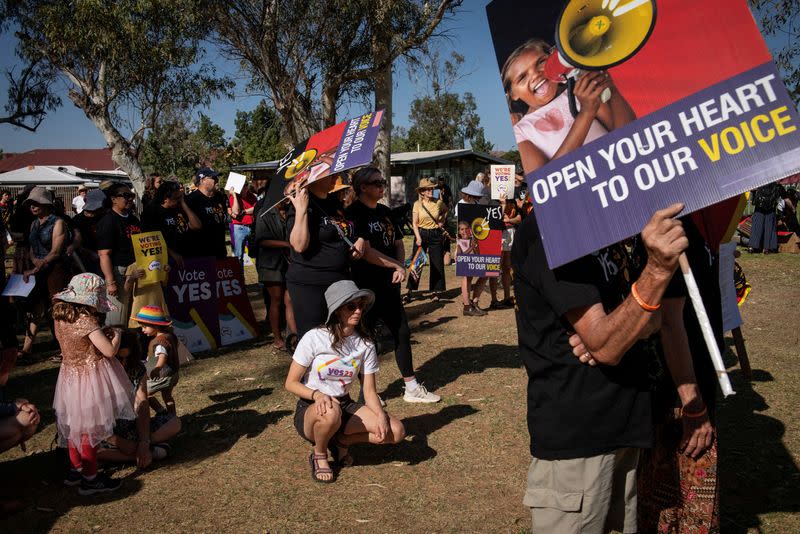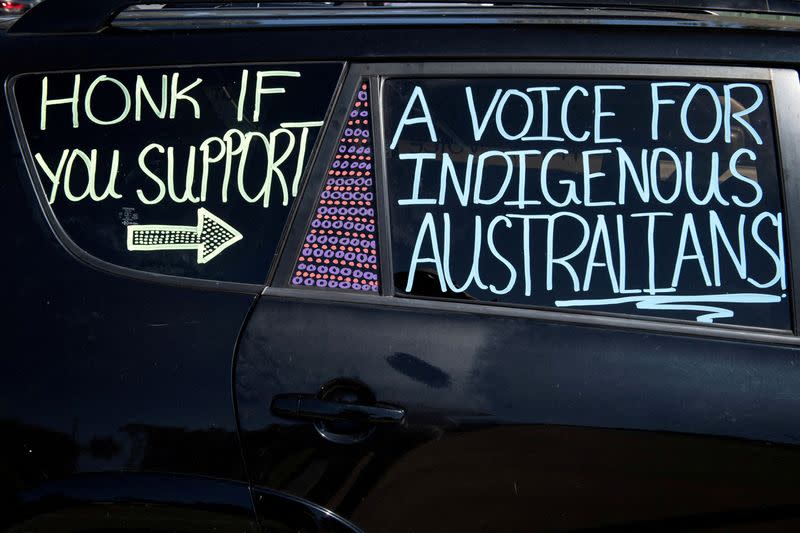Analysis-Indigenous reconciliation at stake as Australia votes on the Voice
By Praveen Menon
SYDNEY (Reuters) - Phone lines at 13Yarn, a national Indigenous helpline in Australia, are ringing off the hook.
National Program Manager Marjorie Anderson's team is receiving three times more calls each week from distressed Aboriginal and Torres Strait Island people, as the country prepares to vote on a landmark referendum on Saturday to recognise Indigenous people in the constitution.
"Aboriginal people aren't feeling safe," Anderson, told Reuters in an interview. "When the debate gets ugly we tend to get more calls as Aboriginal people are feeling overwhelmed. They have told me they've gone off social media because it's really toxic."
Australians will vote 'Yes' or 'No' to a single line question, asking whether they agree to alter the 122-year old constitution to recognise the First Peoples. It will also create a body, called the Voice to Parliament, that can advise the government on matters affecting the Indigenous community.
Supporters believe the change will unite Australia and usher in a new era with its Indigenous people, who continue to be the most marginalised people in Australia. But polling trends indicate the ‘No’ vote is likely to succeed, which experts and human rights organisations fear could push back reconciliation efforts by years.
Conservatives argue the proposal divides Australia by race and gives special rights for Aboriginal people in Australia's founding document.
Misinformation across social media has also sparked fear that the Voice - a purely advisory body - will be a third chamber of parliament, resulting in more federal aid to Aboriginal people, and land disputes between Indigenous and non-Indigenous people.
As the debate echoes across the nation, Aboriginal leaders, journalists, sports personalities and others have become targets of hate speech, with many quitting public discourse.
Nathan Allen, an Aboriginal lawyer at law firm Gilbert + Tobin in Sydney, said harmful rhetoric using racist tropes had gained traction across social media.
"We are talking about business owners, board members, lawyers and chartered accountants with extremely large reach and influence that have these racist and false narrative views, and they are spreading it with all of their energy," Allen said.
'NOT CHARITY'
The Uluru Statement from the Heart, a 2017 document that proposed the Voice to Parliament and set out a roadmap for Indigenous reconciliation with wider Australia, has called for the Voice to be followed with a treaty and a truth-telling process.
"The proposed constitutional amendment is not a charity, rather an obligation flowing from international human rights law," Surya Deva, the United Nations Special Rapporteur on the Right to Development told Reuters in an interview.
In a letter to Australian authorities sent on Oct. 3, and not made public yet, the UN urged that the Voice be treated as only a first step towards the full implementation of the Uluru Statement and the UN Declaration on the Rights of Indigenous Peoples (UNDRIP), Deva said.
The letter would be made public on Dec. 2 after giving time for Australia to respond.
"The referendum has created unfortunate social divisions in Australia and it might take time to heal these divisions. However, we can see a positive even in this negativity: the Voice has exposed the hidden discriminatory attitude towards the Indigenous Peoples," Deva said.
Unlike nations with similar histories like Canada and New Zealand, Australia has not formally recognised or reached a treaty with its First Peoples.
Indigenous Australians, who make up 3.8% of the population, have continued to endure discrimination long after Australia became a nation in 1901. Authorities often relocated Indigenous people from their traditional lands and forcibly separated Indigenous children, resulting in a "stolen generation" because of policies that ran from the mid-19th century to the 1970s.
'FOREBODING SENSE OF DREAD'
Some Indigenous and non-Indigenous leaders have asked for the referendum to be called off entirely, and the latest poll shows support for the Voice even from Indigenous voters is dropping. Most analysts expect the 'No' vote to prevail.
"The Voice will become yet another battleground for many Aboriginal voices to disagree, fall out and create division," Jacinta Nampijinpa Price, an Indigenous woman and shadow Indigenous Affairs minister who is leading the 'No' campaign, said in a speech last month.
Prime Minister Anthony Albanese, a 'Yes' supporter, said he remained hopeful Australians would vote in favour of the proposal, but added he would not legislate the Voice if it was rejected.
Ian Hamm an Aboriginal man who chairs the First Nations Foundation, an Aboriginal rights organisation, said he felt his community’s voice was at risk of being silenced.
"I actually feel a sense of dread. If the polls are right, then it's a foreboding sense of dread," he said.
(Reporting by Praveen Menon; Editing by Kat Stafford and Stephen Coates)



